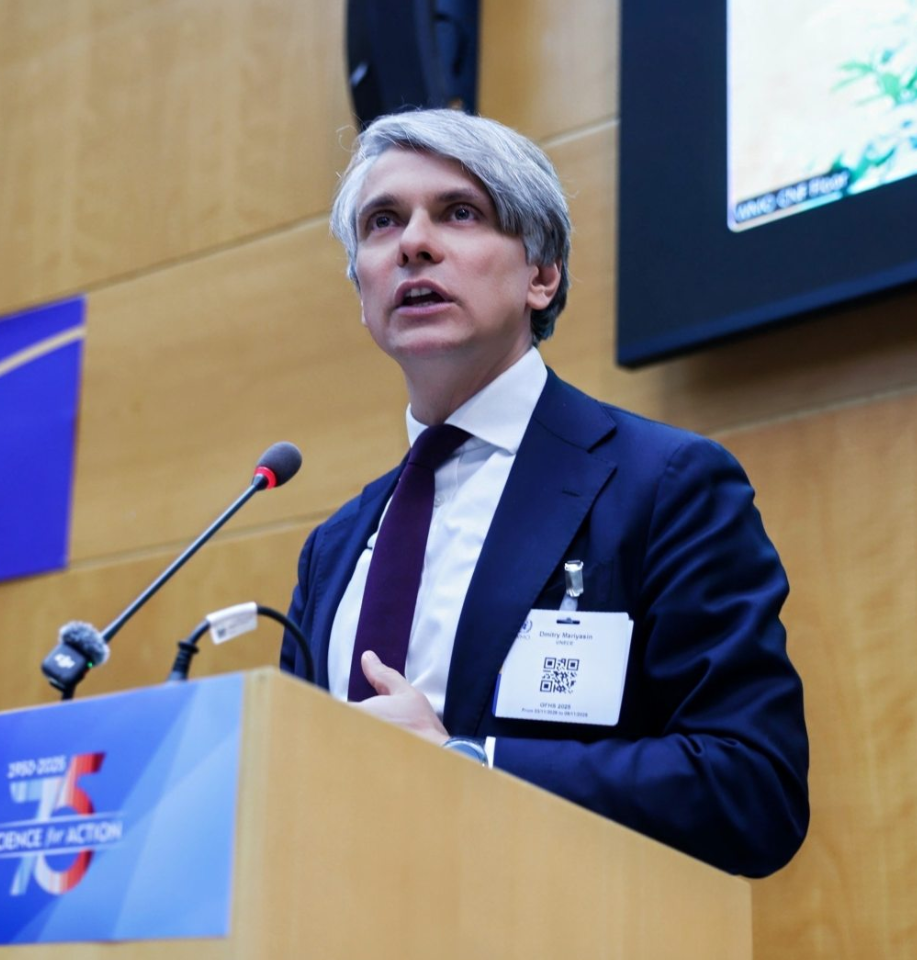


Committed to Sustainable Cities and Human Settlements for All

In Special Consultative Status with ECOSOC

Keynote Statement by Mr. Dmitry Mariyasin, UNECE Deputy Executive Secretary
Advance local innovation and collaboration for a resilient and sustainable urban future
Geneva, 4 November 2025
World Meteorological Organization Headquarters, Salle Obasi
Distinguished colleagues, esteemed partners, ladies and gentlemen,
It is a great honor to address you today at the 20th Annual Session of the Global Forum on Human Settlements. I extend my warmest greetings to the organizers, co-hosts, speakers, and all participants gathered here with a shared commitment to advancing sustainable urban development. This Forum remains an important platform for dialogue, innovation, and cooperation.
As we meet at this critical moment, our shared task—to shape resilient, inclusive, and thriving cities—is more important than ever.
Urban October has just concluded—a month dedicated to spotlighting the opportunities and challenges of urbanization worldwide. This year’s focus on “Urban Crisis Response” underscored the urgent need to strengthen cities’ roles and resilience amid an array of interlinked crises—from climate shocks and conflicts to growing inequality.
Cities sit at the frontline of these challenges. They are not only the most exposed but also uniquely positioned to address them through ingenuity, leadership, and partnership.
These urban centers are engines driving economic growth and innovation, yet they also concentrate vulnerabilities—environmental, social, and economic. Their important role in achieving the Sustainable Development Goals and the Paris Climate Agreement has never been clearer or more urgent.
To meet these imperatives, we must pursue integrated, innovative, and inclusive urban solutions—leveraging data, technology, and participatory governance to build cities capable of weathering converging global crises.
At UNECE, our commitment to sustainable urban development is deeply rooted in integrated environmental governance, resilient urban planning, land administration and affordable and adequate housing policies.
For example, our five Multilateral Environmental Agreements collectively strengthen clean air, water management, risk prevention, and public participation—cornerstones of sustainable cities. Together, they ensure that development decisions are informed by environmental impact assessments, that transboundary risks are managed collaboratively, that citizens have access to environmental information, and that air and water quality are protected. These principles are the foundation of greener, healthier, and more resilient cities.
Complementing these frameworks, the Transport, Health and Environment Pan-European Programme (THE PEP) promotes healthy and sustainable urban mobility, reducing emissions while improving access and well-being.
To foster urban resilience and innovation, UNECE also supports cities through the development of guidelines and frameworks, as well as technical cooperation - our efforts span from:
- the UN4UkrainianCities project, helping rebuild war-affected urban areas and
- tailoring policy recommendations also to local authorities through our Country Profiles on Urban Development, Housing and Land Management
- launching a new City-to-City Collaboration Platform to connect urban needs with expertise and resources.
Initiatives such as the Trees in Cities Pledge, with nearly 20 million trees planted across 100 cities, show how local actions can deliver tangible environmental benefits.
Distinguished participants and colleagues, the successful implementation of at least 65% of the SDGs depend on local governments. Achieving these goals requires empowering cities and local governments through data, finance and partnerships. UNECE supports this effort through the preparation of Regional Guidelines for Voluntary Local Reviews (VLRs). Voluntary Local Reviews serve as essential tools for local and regional governments to monitor and report on their progress towards achieving SDGs, identify gaps, and share good practices. We also support cities directly in the preparation of VLRs, most examples include Bishkek, Dushanbe and Tbilisi. These reviews are a cornerstone of localizing the SDGs and translating global commitments into local action.
Also, multilateralism increasingly recognizes cities as indispensable partners in shaping sustainable and resilient societies. The United Nations Forum of Mayors, convened by UNECE, gives local leaders a seat at the international table—as direct actors advancing the 2030 Agenda. Just last month, the fifth meeting of the Forum of Mayors took place here in Geneva. This milestone event was followed by the UNECE Ministerial meeting on housing affordability and sustainability, where Ministers and high-level representatives from 30 UNECE member States committed to actions addressing the growing housing crisis across the pan-European region. Importantly, they pledged to recognize and reinforce the role of local governments in implementing sustainable, affordable and climate-resilient housing policies, underscoring cities’ key role in tackling one of today’s most pressing urban challenges. Our work aligns closely with the 2024 United Nations Pact for the Future, which calls for stronger cooperation between the UN system and local authorities. The July 2025 report by Secretary-General outlines actionable recommendations to deepen collaboration, between the United Nations and local and regional authorities. Recommendations include enhancing existing platforms such as the Local and Regional Governments Forum and the Forum of Mayors and revitalizing the United Nations Advisory Committee of Local Authorities (UNACLA). In addition, it also recommends exploring new institutional arrangements, such as an ECOSOC Forum of Mayors or even permanent observer status for local and regional authorities at the General Assembly.
UNECE fully supports these efforts and urges Member States to champion the inclusion of local authorities in multilateral decision-making. The United Nations Forum of Mayors stands as a model for this new era of inclusive governance.
Within the UNECE region, multilevel governance has evolved beyond coordination and participation to innovative institutional models—such as the Forum of Mayors—that strengthen policy coherence, legitimacy, trust, and crisis response. As highlighted in a recent document by our partners at the University of Geneva (UNIGE) as a UN Geneva Charter Centre of Excellence, multilevel governance empowers cities as innovation laboratories, facilitates resource mobilization, and promotes foresight and predictive governance essential for sustainable urban development.
Challenges remain across governance levels and sectors, including geopolitical divisions, institutional silos, local capacity constraints, and limited civic engagement. Strengthening multilevel governance requires systematic integration of agile principles to enable feedback, embed foresight and AI, reinforce fiscal autonomy and capacity, safeguard city diplomacy, and foster genuine co-creation with civil society.
UNECE is supporting these efforts to promote agile, inclusive governance essential for achieving the 2030 Agenda in an era of rapid change.
Colleagues,
Advancing equitable, resilient, and thriving human settlements is our collective duty. Empowering cities with the right tools, partnerships, and data will transform urban futures—ensuring that no one is left behind.
The Global Forum on Human Settlements offers a unique opportunity to shape the cities of tomorrow. Through leadership, innovation, and cooperation, we can build urban environments that are not only sustainable but also just and resilient.
Thank you for your dedication—and may this Forum be fruitful and impactful.
Copyright © Global Forum on Human Settlements (GFHS)
